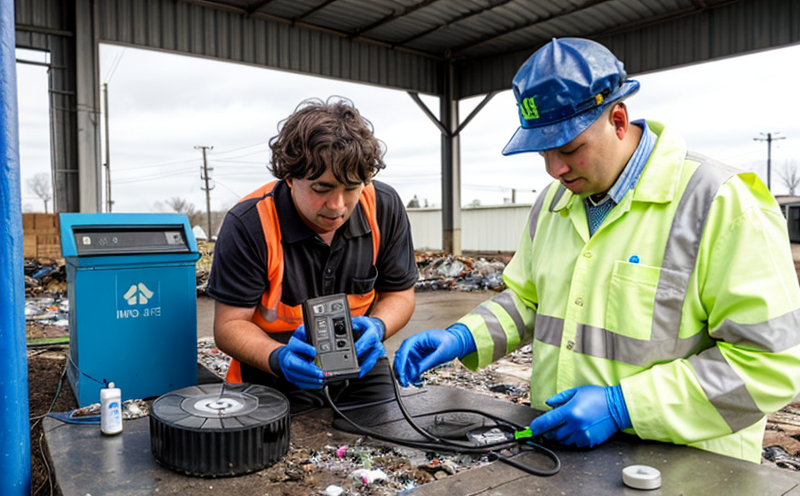ISO 23944 Reuse and Recycling Efficiency of Electronics
The International Standard ISO 23944 focuses on optimizing the reuse and recycling efficiency of electronics, ensuring that they are processed in a manner that maximizes their value while minimizing environmental impact. This service is crucial for quality managers, compliance officers, R&D engineers, and procurement teams who need to ensure regulatory compliance, improve sustainability practices, and enhance material recovery processes.
The standard provides guidance on the design, production, use, and disposal of electronic equipment, ensuring that they are recyclable or reusable. It addresses the entire lifecycle of electronics from manufacturing to end-of-life management. Compliance with this standard helps organizations meet stringent environmental regulations and contribute positively to a circular economy.
Electronics recycling involves intricate processes that require precision and expertise to ensure efficient material recovery and minimal environmental impact. The ISO 23944 framework supports these efforts by providing detailed specifications on how to evaluate the efficiency of reusing and recycling electronic waste. This evaluation includes not only the mechanical but also the chemical aspects of the process, ensuring a holistic approach.
The standard covers various aspects such as:
- Material identification and separation
- Energy consumption during recycling processes
- Emission control measures
- Product design for recyclability
- Recycling efficiency metrics
In real-world applications, this standard is particularly beneficial for large-scale electronics manufacturers and e-waste recyclers who aim to enhance sustainability. For instance, a leading electronics company might use ISO 23944 to redesign its products for easier disassembly and material recovery. This not only reduces waste but also increases the lifespan of materials, thereby reducing costs.
Another example is an e-waste recycler that uses this standard to evaluate the efficiency of its recycling processes. By measuring key metrics such as energy consumption and emission levels, they can identify areas for improvement and implement strategies to enhance sustainability.
Why It Matters
The global electronic waste problem is growing rapidly due to increasing consumer demand for new devices and the obsolescence of existing ones. According to reports, approximately 53.6 million metric tons of e-waste were generated in 2019 alone, with only a fraction being properly recycled or reused. This highlights the critical need for efficient recycling practices that not only recover valuable materials but also reduce environmental impact.
ISO 23944 addresses these issues by providing a robust framework for assessing and improving the efficiency of electronic waste reuse and recycling processes. By following this standard, organizations can:
- Evaluate their current practices against international best practices
- Identify opportunities for material recovery and energy savings
- Increase the overall sustainability of their operations
- Comply with increasingly stringent environmental regulations
- Enhance brand reputation through responsible waste management practices
The standard also plays a key role in fostering innovation within the industry by encouraging research and development into more efficient recycling technologies. This, in turn, leads to better materials recovery rates and reduced environmental impact.
Why Choose This Test
- Achieve Compliance: Ensure full compliance with ISO 23944 standards for electronic waste management.
- Enhance Sustainability: Maximize material recovery and minimize environmental impact through efficient recycling processes.
- Innovate: Stay ahead of the competition by implementing cutting-edge recycling technologies that meet international standards.
- Reduce Costs: Optimize energy consumption and reduce waste disposal costs, thereby improving overall operational efficiency.
- Better Reputation: Demonstrate a commitment to sustainability and responsible business practices, enhancing your brand's reputation.
- Global Recognition: Gain acceptance in international markets where compliance with ISO standards is required or preferred.
International Acceptance and Recognition
The ISO 23944 standard has been widely recognized for its role in promoting sustainable electronics recycling practices. It is accepted by governments, industry leaders, and environmental organizations worldwide as a key tool for managing electronic waste responsibly.
Countries across the globe have adopted various regulations that require compliance with standards like ISO 23944 to ensure proper management of e-waste. For example, Europe's WEEE (Waste Electrical and Electronic Equipment) Directive is heavily influenced by this standard, encouraging member states to implement robust recycling programs.
International organizations such as the United Nations Environment Programme (UNEP) also recommend adherence to ISO 23944 for its comprehensive approach to electronic waste management. By aligning with these standards, organizations can ensure that their practices are in line with global best practices and contribute positively to international efforts towards a circular economy.
This widespread acceptance makes ISO 23944 an essential tool for any organization involved in the electronics industry, whether it be manufacturing, recycling, or waste management. It provides a clear roadmap for achieving sustainable electronic waste reuse and recycling processes that are both efficient and environmentally friendly.





